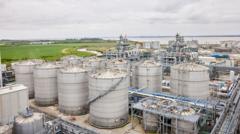Is a Bioethanol Plant's Shutdown on the Horizon?

Vivergo Bioethanol Plant Closure: Implications and Insights
The recent decision by Vivergo, one of the UK’s two bioethanol plants, to cease production marks a significant turning point for the bioethanol industry in the country. With 160 employees facing layoffs and the site set for demolition by the end of the year, the implications of this closure extend beyond just the immediate loss of jobs. The government's refusal to provide financial support has raised concerns about the future of bioethanol as a sustainable energy source in the UK, especially amidst increasing competition from imported US ethanol. This article delves into the factors leading to Vivergo's closure, its impact on the industry, and what it means for the future of biofuels in the UK.
The Background of Vivergo and the UK Bioethanol Industry
Vivergo, owned by Associated British Foods, has been a crucial player in the UK bioethanol market. Bioethanol is produced from renewable resources such as waste oil or grains and is primarily used as an additive in fuels to reduce harmful emissions. For instance, it is an integral component of E5 and E10 petrol as well as sustainable aviation fuel.
However, the industry has faced numerous challenges, particularly from international competition. The UK government’s recent decision to sign a trade agreement that eliminated tariffs on US ethanol imports has further complicated matters for domestic producers. This agreement allowed for 1.4 billion liters of US ethanol to enter the UK market tariff-free, significantly impacting local producers who are already struggling to compete with cheaper imported alternatives.
The Government's Decision: A Turning Point
The UK government announced its decision not to provide financial assistance to the bioethanol sector, stating that such support would not deliver value for taxpayers or address the industry's long-term viability. This decision was described by Ben Hackett, Vivergo's managing director, as a "massive blow to Hull and the Humber," emphasizing the significant economic impact on the local community.
Hackett criticized the government's stance, suggesting that the bioethanol sector was seen as expendable in the face of other economic priorities. The closure of Vivergo not only affects the employees directly but also has a ripple effect on suppliers and other businesses in the agricultural sector, particularly UK farmers who may struggle to find markets for non-food-grade wheat.
Impacts on Employment and Local Economy
The layoff of 160 employees is just the tip of the iceberg. The closure of Vivergo will have significant implications for the local economy, particularly in Hull and the surrounding areas. The loss of jobs in the bioethanol sector is likely to lead to increased unemployment rates and reduced economic activity in the region.
Moreover, the closure could result in negative consequences for the agricultural sector, as local farmers rely on bioethanol plants to purchase their crops. With Vivergo shutting down, these farmers may find it challenging to secure alternative markets for their products, leading to potential financial distress in the agricultural community.
The Broader Implications for Renewable Energy in the UK
The closure of Vivergo raises questions about the future of renewable energy in the UK. With the government's commitment to reducing carbon emissions and transitioning to cleaner energy sources, the loss of a significant bioethanol producer could hinder progress in achieving these goals. Sustainable aviation fuel and other biofuels play a vital role in reducing greenhouse gas emissions, and the decline of domestic production may lead to increased reliance on imports, which can pose risks to energy security.
Andrew Symes, the CEO of OXCCU, voiced concerns about the UK's increased dependency on imported CO2 and ethanol, highlighting the potential risks associated with such reliance. The government’s decision to prioritize trade deals over domestic energy production could have long-lasting implications for the UK’s energy landscape.
The Future of Bioethanol Production in the UK
As Vivergo prepares to close its doors, attention turns to Ensus, the other bioethanol plant in the UK located in Redcar, Teesside. The future of this facility remains uncertain as it awaits news on potential government support for its CO2 production. Ensus has positioned itself as a critical player in the bioethanol market, and its survival may hinge on the government’s willingness to provide assistance.
Furthermore, the need for innovation and investment in bioethanol technology has never been more pressing. The industry must adapt to remain competitive in a global market increasingly dominated by cheaper imports. Implementing measures such as carbon capture and storage could provide a pathway for bioethanol plants to enhance their sustainability and attractiveness to consumers.
Conclusion: The Path Forward for the Bioethanol Industry
The closure of Vivergo is a stark reminder of the challenges facing the UK bioethanol industry. As competition intensifies and government support wanes, the path forward for biofuels in the UK appears increasingly precarious. The government must balance its trade commitments with the need to foster a sustainable domestic energy sector. The potential loss of bioethanol production not only jeopardizes jobs but also undermines the UK’s efforts to transition to a low-carbon economy.
As stakeholders in the industry reflect on the implications of this closure, the focus must shift towards finding viable solutions that support domestic production, enhance competitiveness, and ensure energy security. In doing so, the UK can work towards a future where renewable energy sources play a pivotal role in achieving sustainability goals.
FAQs
What is bioethanol and how is it produced?
Bioethanol is a renewable fuel made from organic materials such as waste oil and grains. It is produced through fermentation and distillation processes, where sugars from these materials are converted into ethanol. This fuel is often blended with petrol to reduce carbon emissions.
Why did the UK government decide not to support the bioethanol sector?
The UK government determined that providing financial support to the bioethanol sector would not deliver value for taxpayers and would not resolve the industry's long-term challenges. They emphasized prioritizing trade agreements that protect jobs in other sectors.
What are the implications of Vivergo's closure for local farmers?
The closure of Vivergo will likely affect local farmers who supply non-food-grade wheat to the plant. With one less market for their crops, these farmers may struggle to find alternative buyers, potentially leading to financial difficulties.
What is the future for bioethanol production in the UK?
The future of bioethanol production in the UK remains uncertain. As Ensus awaits news on potential government support, the industry may need to innovate and invest in new technologies to remain competitive against imported ethanol.
In light of Vivergo's closure, how can the UK bolster its domestic bioethanol production while navigating international trade agreements? #Bioethanol #SustainableEnergy #UKEconomy
Published: 2025-08-18 15:10:14 | Category: technology



